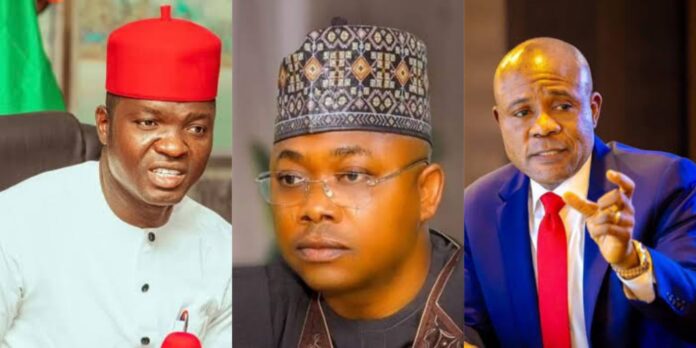As Nigeria continues to navigate its complex socio-political landscape, a new wave of leadership emerges, driven by youthful energy, fresh ideas, and an appetite for innovation.
The rise of young governors in Nigeria is a testament to the growing demand for dynamic governance that resonates with the aspirations of the country’s predominantly young population.
Currently, several states across the federation are led by governors who are not only under 55 but also embody a shift in political culture.
These leaders bring to the table a mix of legislative experience, private-sector expertise, and grassroots connections.
From improving infrastructure and education to fostering youth empowerment and economic growth, these young Nigerian governors are redefining what leadership looks like.
This listicle by MCC News explores the top 10 youngest currently serving governors in Nigeria, providing insights into their political journeys, governance priorities, and what their youthfulness means for the future of Nigerian democracy.
If you’re interested in Nigeria’s political evolution, young African leaders, or governance trends, this article is a must-read.
1. Ahmed Usman Ododo – 43 Years
State: Kogi State
Date of Birth: February 7, 1982
Political Party: All Progressives Congress (APC)
Ahmed Usman Ododo, the youngest serving governor in Nigeria, assumed office in 2024.
Before his governorship, he served as the Auditor-General for Local Governments in Kogi State, a role that underscored his commitment to transparency and accountability.
His academic journey includes studies in accountancy at the Federal Polytechnic Bida and a bachelor’s degree in accounting from Ahmadu Bello University, Zaria.
Ododo’s leadership is marked by a focus on fiscal responsibility and grassroots development.
2. Francis Ogbonna Nwifuru – 50 Years
State: Ebonyi State
Date of Birth: February 25, 1975
Political Party: All Progressives Congress (APC)
Francis Nwifuru’s political career is rooted in legislative experience, having served as the Speaker of the Ebonyi State House of Assembly from 2015 to 2023.
His tenure as governor began in 2023, focusing on infrastructural development and educational reforms.
Nwifuru’s leadership style is characterized by inclusivity and a commitment to elevating the state’s economic profile.
3. Peter Ndubuisi Mbah – 53 Years
State: Enugu State
Date of Birth: March 17, 1972
Political Party: Peoples Democratic Party (PDP)
Peter Mbah, a maritime lawyer and entrepreneur, transitioned into politics with a vision to transform Enugu State’s economic landscape.
As the founder of Pinnacle Oil and Gas Ltd., he brings a wealth of private sector experience to his governance approach.
Since taking office in 2023, Mbah has prioritized industrialization and youth empowerment.
4. Mohammed Umaru Bago – 51 Years
State: Niger State
Date of Birth: February 22, 1974
Political Party: All Progressives Congress (APC)
Mohammed Bago’s ascent to the governorship in 2023 followed a notable tenure in the House of Representatives, representing Chanchaga Federal Constituency.
His academic credentials include degrees in political science, management, and finance.
As governor, Bago emphasizes agricultural development and infrastructural expansion to drive economic growth.
5. Monday Okpebholo – 54 Years
State: Edo State
Date of Birth: August 29, 1970
Political Party: All Progressives Congress (APC)
Monday Okpebholo’s political journey includes serving as a senator representing Edo Central before becoming governor in 2024.
His background in business administration and policy studies informs his governance, focusing on economic revitalization and public sector reforms.
Okpebholo’s administration is noted for its efforts in enhancing transparency and accountability.
6. Abba Kabir Yusuf – 54 Years
State: Kano State
Date of Birth: January 5, 1971
Political Party: New Nigeria Peoples Party (NNPP)
Abba Kabir Yusuf, also known as “Abba Gida-Gida,” became governor in 2023 after a vibrant political campaign.
His administration focuses on education, healthcare, and infrastructural development.
Yusuf’s leadership is characterized by a grassroots approach, aiming to bridge the gap between the government and the populace.
7. Agbu Kefas – 54 Years
State: Taraba State
Date of Birth: November 12, 1970
Political Party: Peoples Democratic Party (PDP)
Agbu Kefas, a former military officer, ventured into politics with a vision to harness Taraba State’s agricultural potential.
Since assuming office in 2023, his administration has prioritized security, education, and rural development. Kefas’s leadership is marked by strategic planning and community engagement.
8. Uba Sani – 54 Years
State: Kaduna State
Date of Birth: December 31, 1970
Political Party: All Progressives Congress (APC)
Uba Sani’s political career includes serving as a senator representing Kaduna Central before becoming governor in 2023.
His administration focuses on security, education, and economic diversification. Sani’s approach to governance emphasizes inclusivity and infrastructural development.
9. Ahmad Aliyu – 55 Years
State: Sokoto State
Date of Birth: January 1, 1970
Political Party: All Progressives Congress (APC)
Ahmad Aliyu’s political journey includes serving as the deputy governor of Sokoto State before he was elected governor in 2023.
His administration emphasizes healthcare, education, and agricultural development.
Aliyu’s leadership is noted for its focus on social welfare and economic empowerment.
10. Dikko Umar Radda – 55 Years
State: Katsina State
Date of Birth: September 10, 1969
Political Party: All Progressives Congress (APC)
Dikko Radda, before becoming governor in 2023, served as the Director-General of the Small and Medium Enterprises Development Agency of Nigeria (SMEDAN).
His administration focuses on economic development, youth empowerment, and security. Radda’s leadership is characterized by a commitment to fostering entrepreneurship and innovation.
Conclusion
The emergence of younger leaders in Nigeria’s political landscape signifies a shift towards dynamic and innovative governance.
These governors bring fresh perspectives and are poised to address contemporary challenges with renewed vigour.
Their diverse backgrounds and commitment to development are instrumental in shaping the future of their respective states and the nation at large.
Note: The ages and details provided are based on available information as of May 2025. For the most current updates, refer to official state government sources and verified news outlets.
Also, our sources for this listicle include, Google, Wikipedia and each state’s websites

